
CONTACT specialist knowledge of traditional card and board games derives from some 50 years of research and practice, during which I've compiled a large collection of books and resources. I lead adult education workshops on games appreciation and development, and give talks and lectures on the subject. I've contributed to the planning of games exhibitions and to the running of the annual Mind Sports Olympiad. I've tested and reviewed games, assisted major games publishers with the development of in-house products, and am an accredited consultant on games terminology to the Oxford English Dictionary. I'm also usually willing to advise private individuals freely on the rules and details of particular period games - the more obscure, the better - provided they've already tried the obvious places such as Pagat or rec.games. playing-cards. Please note, however, that I'm not a games publisher nor a publishers' agent for games by other inventors.
As a film enthusiast since childhood, my favourite consultancy work is the staging of indoor games in film and TV productions, especially of historical games for period drama. They include the following:
The BBC-TV drama series
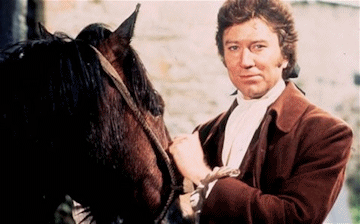 based on Winston Graham's Poldark novels was first screened in 2015.
(A similar series of the same name was broadcast between 1975 and 1977. I never watched it, but have
since discovered Winston Graham to be a very enjoyable novelist. Fortune is a Woman is as re-readable
as the 1956 film version is rewatchable.) Several scenes in the series feature
Whist and French Ruff - the ancestor of Ecarté, a great two hander that I haven't played
for years. It was fun teaching the actors how to play it.
based on Winston Graham's Poldark novels was first screened in 2015.
(A similar series of the same name was broadcast between 1975 and 1977. I never watched it, but have
since discovered Winston Graham to be a very enjoyable novelist. Fortune is a Woman is as re-readable
as the 1956 film version is rewatchable.) Several scenes in the series feature
Whist and French Ruff - the ancestor of Ecarté, a great two hander that I haven't played
for years. It was fun teaching the actors how to play it.
I don't know why
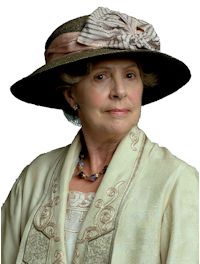
Penelope Wilton
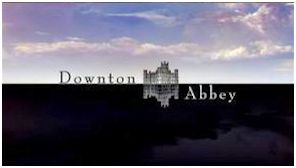
Downton Abbey (actually Highclere House)
people are so snooty about Downton
Abbey - I've enjoyed watching it since it started, having always felt at home above stairs.
So I was pleased to be asked to teach Penelope
Wilton and Maggie Smith how to play
Gin Rummy for a scene in Series 4 (2013), filmed at Ealing Studios. Penelope has long been
one of my favourite actresses - ever since the wonderful BBC sitcom
Ever Decreasing Circles, which
I am even now rewatching on DVD. The only thing that worried me slightly was the possibility of anachronism. The action
takes place in 1922, but Gin didn't really reach England till the 1940s, and even in America I think at this time
it was still known as Gin Poker. However, we might assume that it reached Downton either through Lady Isobel (Penelope
Wilton), who was busy tending soldiers of all nationalities during the First World War, or through the American-born
mistress of Downton Lady Grantham (Elizabeth McGovern, another of my favourites).
Richard Strauss's
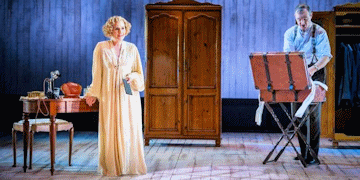
Janis Kelly and Stephen Gadd
(as Christine Storch and Robert Storch)
opera Intermezzo
- "a bourgeois comedy with symphonic interludes" (Strauss) - famously features a Skat-playing scene,
so, although I care little for opera but love Skat, I did enjoy helping the
English National
Opera Company to stage that scene for its 2012 production at the Buxton Festival - especially as Buxton is
my favourite book fair resort.
Sarah
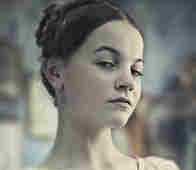
Izzy Meikle-Small as young Estella
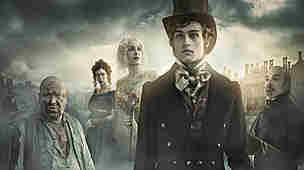
Poster
Phelps's adaptation of Great Expectations, broadcast on BBC TV just after Christmas 2011,
was less well received by the critics than by the public. I concur with many critical comments, such as
the omission of some important characters and an obviously deliberate refusal to admit any of Dickens's
comic relief, but these were compensated for me by the stunning landscape photography, David Suchet's
masterful portrayal of Jaggers (how different from that of the equally laudable Francis L Sullivan
in David Lean's classic version!), the surprising but more convincing take on Miss Havisham (nothing
like Martita Hunt and everybody else's old crone, but a youngish, waif-like figure who would obviously scrub up well),
and the beautiful Izzy Meikle-Small, who brilliantly portrayed the young Estella.
I was sorry that the proposed Whist-playing
scene was cut, and thoroughly critical of the nonsensical dismissal of Dickens's well-chosen contrast of Pip's
childish Beggar-my-Neighbour with Estella's sophisticated Ecarté together with the significant
accompanying conversation. However, young Izzy proved to be the most knowledgeable
card-player I have ever met in the acting profession, and I think it was her idea that she and Pip play
German Whist. The 1850s may have been a little early for this, but no one would have noticed, and
the game looked completely convincing.
Amazing Grace
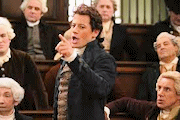
Ioan Gruffudd as William Wilberforce
centres on the contribution of William Wilberforce (1759-1833)
to the abolition of the slave trade. This may sound rather heavy, but it's
handled in a light and very human way. The card-playing scene takes place in
Brooke's Gaming Club, London, in 1792. The stage directions specify Faro,
which would have been authentic, but unfortunately the set and dialogue rather
imply some sort of vying game. As Poker would have been anachronistic, I
changed it to Brag, though I think in reality it had passed its heyday in
this particular social circle by 1792. The film was directed by Michael Apted.
Pushkin's drama includes a scene in a tavern where three principals
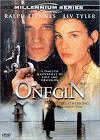
Poster
(Ralph Fiennes, Alun Armstrong and Toby Stevens) are supposedly gambling at
Faro. Actually, Faro was a casino game requiring a large layout, but Pushkin
himself would have played the less elaborate domestic variety, similar to Stuss,
so that's what we went for. The tavern scene was beautifully filmed, but to
my surprise and regret, was dropped on the cutting-room floor. (At least,
it didn't appear in the version shown on television, which is all I've seen.)
Jane Austen's novels
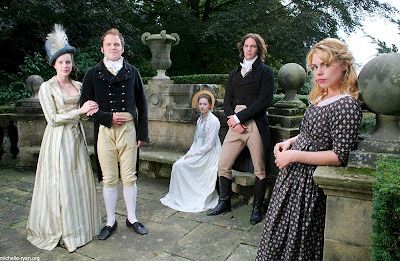
Mansfield Park (1999)
are rich in references to card games and she evidently
knew what she was talking about. Here's the passage from the novel depicted
in Patricia Rozena's 1999 film version made at Ealing Studios:
What shall I do, Sir Thomas? [asks his wife]: Whist and speculation; which will amuse me most?'
Sir Thomas, after a moment's thought, recommended speculation. He was a whist player himself, and perhaps might feel that it would not much amuse him to have her for a partner.
Speculation, an obsolete game previously known to me only from the contents pages of some early Hoyles, turned out to be more interesting than most gambling games I've tried, as it rewards a fair amount of judicious calculation. There's also a scene where two of them play some simple but unspecified card game in the background, for which purpose Beggar my Neighbour (aka Beat Your Neighbour Out of Doors) seemed a suitable recommendation.
Magdalen King-Hall's historical romance,
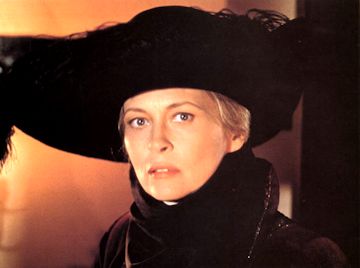
Faye Dunaway looking wicked
set "in Good King Charles's
Golden Days", features a game of Ombre, accurately described as being then
fashionable at court. It was first filmed in 1945 with Margaret Lockwood and
James Mason. In 1982 Michael Winner remade it (on location at North Mimms
House) with a powerful cast including Faye Dunaway, Alan Bates, Denholm Elliott,
Prunella Scales and John Gielgud. Teaching the principals how to look as
if they were playing the game was slightly uphill work, as they all claimed
not to play cards in real life. Still, as Hitchcock said to Ingrid Bergman in
another context, "Fake it". Which is what they did.
I taught various actors, including Nigel Stock and Clive Swift, how to play classical partnership Whist, and others how to play Pope Joan, in a BBC-TV production of The Pickwick Papers, and Clive Swift (again) how to play Bezique in a play by Noel Coward, which I've now forgotten. I've also forgotten the name of the play by Timberlake Wertenbaker that required assistance with the staging and jargon of Piquet.
Incidentally, and somewhat to my surprise, I've met remarkably few actors who do play cards. Gone are the days, apparently, when everyone on Broadway and in Hollywood played Gin Rummy backstage and between takes.
 |
 |
|
| Page top | Site nav |

